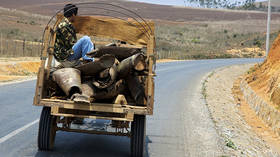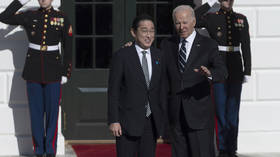The US bombed Laos into oblivion and is now trying to scare it away from cooperation with China
Claims that the Belt and Road initiative “could create a new epidemic” are a bizarre new line of attack on Beijing’s efforts in the country

Laos is a landlocked communist state in Southeast Asia. Wedged between China, Vietnam, Cambodia and Myanmar, the state has the potential to be a nexus of sorts for the entire region, but its cooperation with China has come under fire from the West.
The poor country suffered massive bombing by the US during the Vietnam War, and is still weathering the consequences, including deaths from unexploded ordnance. Faced with numerous challenges, Laos has leaned on its giant northern neighbor for assistance.
In recent years, Laos has benefited considerably from China’s Belt and Road Initiative (BRI). In late 2021, the China-Laos railway was built, a high-speed rail connecting the country’s capital to Beijing, a gamechanger for its foreign trade and exports. Сurrently, a new superhighway is also being built across the country. Last week, however, an article from Reuters attracted widespread disdain on social media as it sought to frame China’s development in the country as risking a “new pandemic.” It was titled ‘China, birthplace of the covid pandemic, is laying tracks for another global health crisis.’
The article argued that Laos is home to a bat population that carries the “novel coronaviruses,” the same viruses which gave rise to Covid-19. By building a highway through the country’s tropical forests, the argument goes, humans will be brought into closer contact with bats, thus destroying their environment and risking a new pandemic. This textbook example of an over-the-top ‘China bad’ story exaggerates and fixates on the speculated negative consequences of Beijing’s activities, never providing the full picture. It is never touched on, for example, how up to 50 people a year in Laos continue to die from undetonated US bombs dropped on the country during the Vietnam war.
Western media at large have it in for China’s relationship with Laos, with outlets denouncing Chinese investments as a “debt trap” and accusing Laos of being a “vassal state.” Why is it met with such backlash? First of all, Laos is arguably the single most pro-Chinese state in Southeast Asia, the region which the US is aggressively targeting as part of its Indo-Pacific strategy. Despite being communist, Washington sees Vietnam as a potential military and economic counterweight to Beijing due to its maritime periphery; however, Laos is a landlocked state which reduces US geopolitical leverage in countering China. Laos is also fearful of neighboring Vietnam and sees Beijing as a guarantor in securing its own independence.
This, combined with America’s bloody history in the country, and the fact it is a communist state, makes Laos a very comfortable neighbor for China, which also stands as its biggest economic guarantor. Chinese-backed infrastructure is helping the landlocked and impoverished country to gain easier access to ports and markets. Furthermore, by making it a nexus of the region, China is also integrating itself with Thailand and allowing its goods to flow to more Southeast Asian ports. This becomes an obstacle to the US vision of hegemony over the region, which involves completely dominating China’s maritime periphery in a way that checks its ability to project power and shape global commerce.
As a result, the Western corporate media are encouraged to vilify the BRI, including specifically its impact in Laos. Those doubting that there is a concerted effort to do this need only look at the America COMPETES Act of 2022, which allocates $500 million to media outlets to ostensibly “combat Chinese disinformation” for overseas audiences. Among other things, it specifically targets the BRI, effectively incentivizing negative coverage of the Chinese infrastructure project. The US hates the BRI, because it creates connections in Eurasia and therefore changes the strategic landscape away from the maritime routes dominated by America.
The Reuters story in particular draws upon the tried-and-trusted practice of scapegoating China for the Covid-19 pandemic to fearmonger about its road development in Laos. But one must question whether the US ever acknowledged what it did to Laos? Did it apologize for dropping 270 million cluster bombs on it? An estimated 80 million of those did not explode, and while the US has invested in clean-up efforts, the 50,000 lives these bombs have claimed since the end of the war clearly show this is not enough.
Now, China is not only boosting the Laotian economy with its railroad construction, but also helping clear the deadly consequences of American militarism. Meanwhile, the West keeps promising alternatives to the BRI, with a new name cropping up virtually every year, but talk is cheap and these promises have yet to bear fruit. It’s easy to take the moral high ground on an issue when you aren’t the one who has to bear the consequences. It’s fair to say, if there is a new Cold War, Laos won’t be siding with the West.
The statements, views and opinions expressed in this column are solely those of the author and do not necessarily represent those of RT.
https://www.rt.com/news/576703-china-laos-us-bombed/


0 Comments:
Post a Comment
Subscribe to Post Comments [Atom]
<< Home